Politics
Netumbo Nandi-Ndaitwah: Meet Namibia’s 72-year-old First Female President
Published
6 days agoon
By
Ekwutos Blog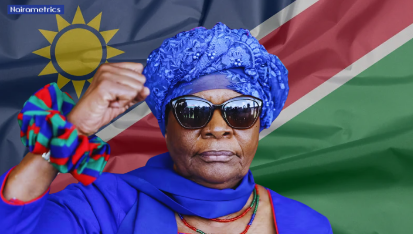
Netumbo Nandi-Ndaitwah made history on March 21, 2025, as she was sworn in as Namibia’s first female president, reaching the pinnacle of leadership nearly six decades after joining the country’s liberation movement.
At 72 years old, Nandi-Ndaitwah’s election in November 2024 placed her among a select group of female African leaders, following the likes of Ellen Johnson Sirleaf of Liberia, Joyce Banda of Malawi, and Samia Suluhu Hassan of Tanzania.
Her inauguration, attended by regional leaders and former female heads of state, coincided with Namibia’s 35th independence anniversary.
However, due to heavy rains, the event was relocated from a stadium to the presidential office, where she took her oath in front of visiting dignitaries from South Africa, Zambia, Congo, Botswana, Angola, and Kenya.
How it all started
Born on October 29, 1952, in Onamutai, Namibia, Nandi-Ndaitwah’s political journey began at just 14 years old when she joined the South West Africa People’s Organization (SWAPO), the party that led Namibia’s struggle for independence from South Africa.
- Forced into exile in 1973, she worked at SWAPO’s headquarters in Zambia and later pursued political and diplomatic studies in the Soviet Union and the United Kingdom.
- Over the years, she served as Namibia’s deputy prime minister from 2015 to 2024, minister of international relations and cooperation.
- From 2012 to 2015, the minister of environment and tourism from 2010 to 2012, and minister of women affairs and child welfare from 2000 to 2005.
- In 2017, she became the first woman elected as SWAPO’s vice president and later became the party’s first female presidential candidate in 2024.
Following the death of President Hage Geingob in February 2024, she was appointed vice president, serving briefly under acting President Nangolo Mbumba before winning the election.
What to know
As Namibia’s fifth president, Nandi-Ndaitwah has vowed to continue strengthening the country’s democracy and driving economic progress. In her inaugural address, she emphasized the need to preserve the gains of independence while ensuring economic and social advancement for all Namibians.
She has pledged to focus on boosting economic growth, improving social welfare, and enhancing Namibia’s role in regional and global diplomacy.
“The task facing me as the fifth president of the Republic of Namibia is to preserve the gains of our independence and ensure that the unfinished agenda of economic and social advancement is carried forward with vigor and determination,” she said in her inaugural address.
Her presidency comes at a crucial time for Namibia, as the country navigates economic challenges, youth unemployment, and sustainable development goals. She has positioned herself as a leader committed to addressing these issues with determination and vision.
Her lifelong commitment to public service and governance has earned her multiple accolades, including the Inter-Generational Leadership Award at the 2024 Nala Feminist Summit, the Thought Leadership Award at the Namibia Sustainable Development Awards, and an honorary doctorate from the University of Dar es Salaam.
Married to Epaphras Denga Ndaitwah, former Chief of the Namibian Defence Force, she remains a staunch advocate for women’s empowerment, education, and community development.
You may like
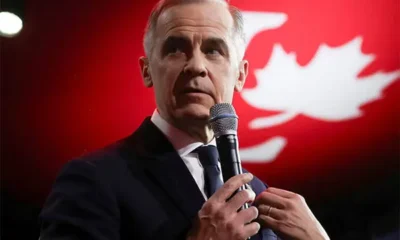

Canada PM Carney declares Canada’s traditional ties with US are over amid auto tariff threats


Kidnappers ki!ll abducted female realtor in Delta
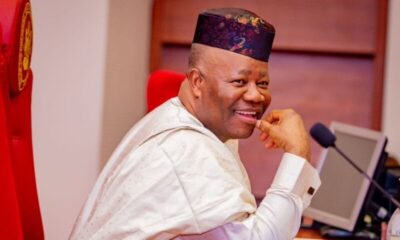

2027: Kano already secured for APC – Akpabio
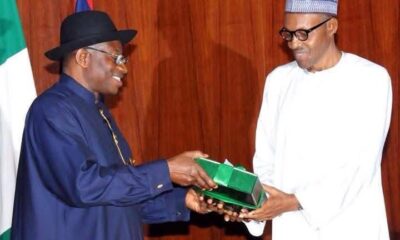

Soon, Nigeria will mark ten years of world’s most devastating power shift and handover. – Success Opara
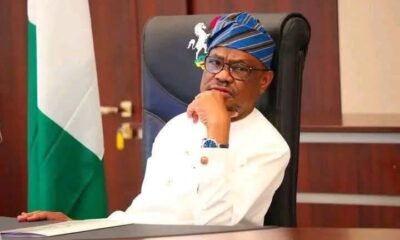

FEDERAL APPOINTMENTS GIVEN TO RIVERS STATE PEOPLE THROUGH THE INSTRUMENTALITY OF WIKE


Delta State Governor, Sheriff Oborevwori” has directed the Provost of Delta State College of Nursing Science, Agbor, to withdraw the query letter issued to a nursing student
Politics
Canada PM Carney declares Canada’s traditional ties with US are over amid auto tariff threats
Published
7 hours agoon
March 28, 2025By
Ekwutos Blog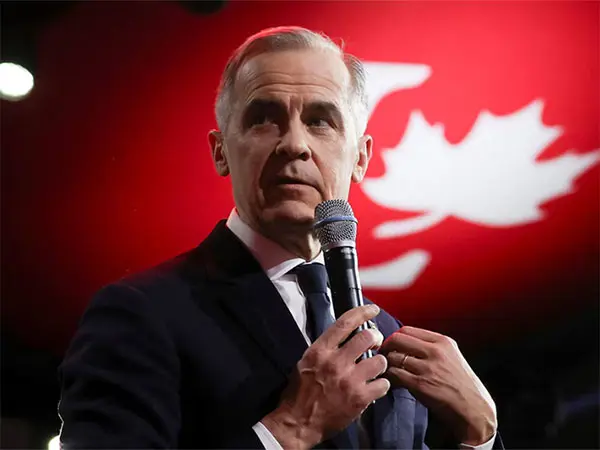
Ottawa [Canada], March 28 (ANI): In a dramatic shift in Canada‘s foreign policy, Prime Minister Mark Carney on Thursday declared that the long-standing economic and security relationship between Canada and the United States has ended, responding to US President Donald Trump‘s announcement of new auto tariffs that could severely impact Canada‘s economy, Politico reported.
“The old relationship we had with the United States, based on deepening integration of our economies and tight security and military cooperation, is over,” Carney stated on Parliament Hill after breaking from the federal campaign trail in response to Trump’s latest threats.
Trump announced Wednesday that his administration would impose a 25 percent tariff on auto imports from Canada, the European Union, Japan, and South Korea. He also threatened to introduce additional tariffs targeting major UStrading partners.
In reaction, Carney said that he would speak with Trump in the coming days but made clear that any discussion must respect Canada‘s sovereignty. “We must fundamentally reimagine our economy. We will need to ensure that Canada can succeed in a drastically different world,” he said.
Carney convened his Cabinet’s committee on Canada–US relations upon returning to Ottawa. Canada has indicated it is ready to retaliate but has not revealed specific countermeasures. “We are facing a comprehensive and broad negotiation,” Carney said, adding that he would not disclose Canada‘s response strategy prematurely.
Flavio Volpe, president of the Automotive Parts Manufacturers Association of Canada, warned that if the tariffs proceed, both countries’ auto industries would be paralysed within a week. “One day, two days, three days where you hope the president shows you mercy. You’re a publicly traded company whose share price is taking a beating, and you have a fiduciary obligation to shareholders,” Volpe told Politico.
Ontario Premier Doug Ford spoke with USCommerce Secretary Howard Lutnick on Wednesday about the potential impact on his province. According to Ford, Lutnick explained that tariffs on vehicles from Canada and Mexico would be adjusted based on US content. For example, if a car built in Mexico contains 50 percent American parts, the tariff rate would be reduced to 12.5 percent instead of the full 25 percent.
“He’s reassuring us that there’ll be no plant closures. My response was Ronald Reagan’s response: Trust but verify,” Ford said. “If they’re opening or closing, it’s going to be up to the CEOs.”
Ford also confirmed that he spoke with Carney and that both agreed Canada would fully retaliate if necessary. Ottawa has previously stated that it could impose up to CAD 155 billion in counter-tariffs on US goods.
Trump responded on Truth Social early Thursday, warning that if Canada and the EU coordinated against the tariffs, the US would introduce even harsher trade measures. “If the European Union works with Canada in order to do economic harm to the USA, large-scale Tariffs, far larger than currently planned, will be placed on them both in order to protect the best friend that each of those two countries has ever had!” Trump wrote.
Carney dismissed Trump’s threat, asserting that Canada would act in its own national interest. “What is clear is that we as Canadians have agency, we have power. We are masters in our own home,” he said. “We can control our destiny.”
Since becoming Liberal Party leader on March 9, Carney has not spoken directly with Trump. While members of his Cabinet may travel to Washington, he stated that he has no immediate plans to do so. Volpe suggested that a phone call would be preferable to an in-person visit.
“I don’t think it’s in anybody’s interest in Canadato get Zelenskyy-ed,” Volpe said, referring to how the Biden administration has handled Ukraine’s leader. “They’ve shown that they lack the class to treat an ally whose people are dying with any respect. I imagine that we’d be risking that as well.”
He also advised that Canada remain patient and allow the economic fallout in the US to take effect. “What if we go to the other side and everything shuts down, and 950,000 US auto workers are sitting around? That’s ugly, but that’s also hopeful,” Volpe said. “That’s a whole group that people are going to have to hear from, and they’re not going to talk about the price of eggs. They’re going to talk about how to make rent.”
Lana Payne, president of Unifor, Canada‘s largest private-sector union, called on the government to protect auto workers and warned the US against trying to shift manufacturing southward while maintaining access to Canada‘s market. “If you think you can shift production, factories, mills and reinvest in the United States out of Canada and think that you’re going to have open access to our market, you need to think again,” Payne said.
Canadian premiers have also voiced concerns. “Here’s the thing: Donald Trump is trying to create uncertainty all over the world, in Canada included. And he’s trying to make people panic so that he can get a deal that takes advantage of us,” said Manitoba Premier Wab Kinew.
Quebec Premier Francois Legault called for an immediate renegotiation of the United States-Canada-Mexico Agreement (USMCA) but acknowledged that might not be realistic under Trump. “It has to happen as soon as possible because right now, we cannot start negotiating piece by piece a new agreement,” Legault said. “But we have to be realistic. Is Mr. Trump open to this negotiation?”
Mexico, Canada, and South Korea currently benefit from duty-free access to the US auto market under trade agreements that Trump renegotiated during his first term. However, the new tariffs could significantly disrupt North America’s integrated auto supply chains, Politico reported.
Mayors from Canada, Mexico, and the US are set to meet in Washington on Friday for a trade summit, where they will advocate for tariff relief.
Candace Laing, president and CEO of the Canadian Chamber of Commerce, criticised the tariffs as a reckless economic move that could cost thousands of jobs in both countries. She noted that the Ontario-Michigan supply chain alone produces nearly a quarter of North America’s vehicles and warned that Trump’s tariffs would significantly increase vehicle costs. “Under Trump’s tariffs, the cost of a pickup truck would rise by USD 8,000,” she said.
According to US Commerce Department data, the United States imported USD 214 billion worth of passenger cars in 2024. The US government has stated that the new tariffs will take effect on April 3, just one week away.
Politics
2027: Kano already secured for APC – Akpabio
Published
7 hours agoon
March 28, 2025By
Ekwutos Blog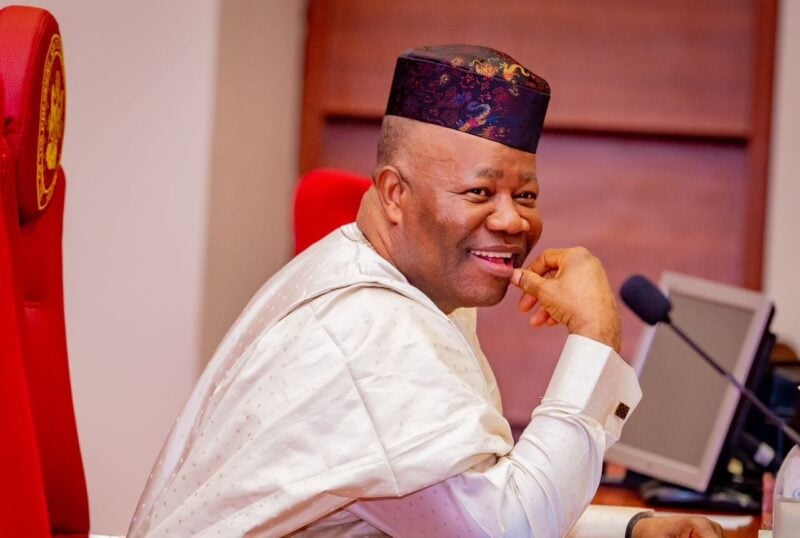
Senate President Godswill Akpabio says Kano State remains a stronghold for the All Progressives Congress, APC, ahead of the 2027 general elections.
Akpabio said his confidence is based on the strategic influence of Deputy Senate President, Barau Jibrin, APC National Chairman Abdullahi Ganduje, and Special Adviser to the President on Senate Matters, Senator Basheer Lado.
The President of the Senate stated this during a visit to Lado in his office at the National Assembly.
He applauded him for ensuring seamless and confidential communication between the Executive and the Senate, describing his performance as unprecedented.
“With the Deputy Senate President, the National Chairman of APC, and your strategic influence, Kano is already secured for the APC ahead of 2027,” Akpabio said.
“Since Senator Lado assumed office, there has not been a single leakage of private communication between the Presidency and the Senate,” hee said.
Akpabio reiterated the importance of maintaining confidentiality in governance, warning that leaks could negatively impact national security and decision-making.
He also acknowledged Lado’s role in enhancing collaboration between the Executive and the Legislature, ensuring smoother communication and coordination.
“Your performance over the last eight months has been outstanding. You have strengthened the synergy between the Executive and the Legislature, making governance more effective,” he added.
Politics
Soon, Nigeria will mark ten years of world’s most devastating power shift and handover. – Success Opara
Published
7 hours agoon
March 28, 2025By
Ekwutos Blog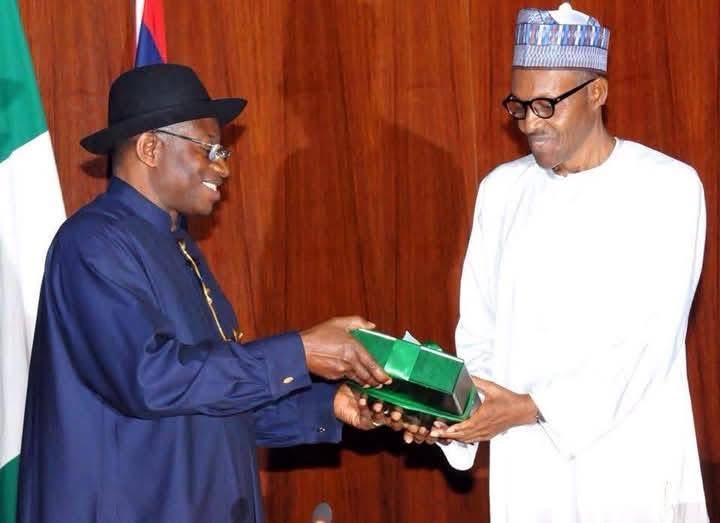
Soon, Nigeria will mark ten years of world’s most devastating power shift and handover.
After ten years, everyone is now convinced that it was a curse that befell Africa’s most populous nation — a curse that brought pain, plague, sorrow, hardship, insecurity, death and ultimately ended a nascent democracy.
It was a mandate procured with lies, hate, fr@ud and the blo0d of innocent people.
Nigeria’s power shift from President Goodluck Jonathan to President Muhammadu Buhari in 2015 was a significant event, marking the first time an incumbent president lost re-election in the country.
This transition was seen as a major milestone in Nigeria’s democratic journey
Some of the challenges Nigeria faced during this period include:
Economic instability: The country faced a recession in 2016, largely due to a decline in global oil prices.
Security concerns: The Boko Haram insurgency continued to pose a significant threat to national security.
Infrastructure deficits: Nigeria’s infrastructure, including its power sector, remained underdeveloped, hindering economic growth.
Despite these challenges, the transition marked an important step in Nigeria’s democratic development, demonstrating the country’s ability to transfer power peacefully.
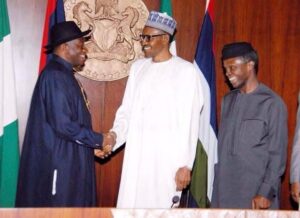
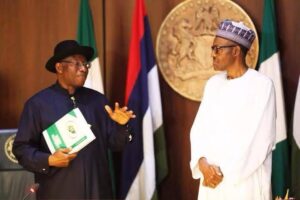
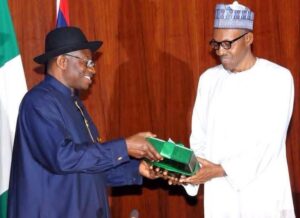
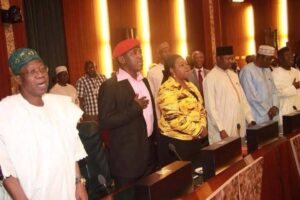
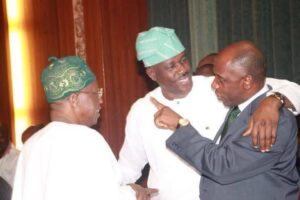
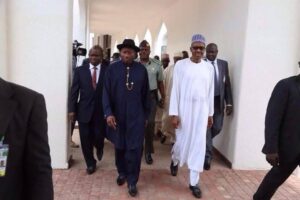

Canada PM Carney declares Canada’s traditional ties with US are over amid auto tariff threats

Kidnappers ki!ll abducted female realtor in Delta

2027: Kano already secured for APC – Akpabio
Trending

 Trending5 months ago
Trending5 months agoNYA demands release of ‘abducted’ Imo chairman, preaches good governance
- Business5 months ago
US court acquits Air Peace boss, slams Mayfield $4000 fine

 Politics5 months ago
Politics5 months agoMexico’s new president causes concern just weeks before the US elections
- Entertainment5 months ago
Bobrisky transferred from Immigration to FCID, spends night behind bars
- Entertainment5 months ago
Bobrisky falls ill in police custody, rushed to hospital

 Politics5 months ago
Politics5 months agoRussia bans imports of agro-products from Kazakhstan after refusal to join BRICS

 Politics5 months ago
Politics5 months agoPutin invites 20 world leaders
- Politics1 year ago
Nigerian Senate passes Bill seeking the establishment of the South East Development Commission.

